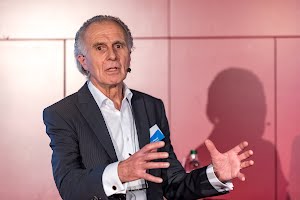Stuart D.G. Robinson is specialised in two key areas: 1) how to prevent, de-escalate and resolve serious crises, conflicts and dysfunctionality in political, corporate and private life and 2) how to create 'strong organisational cultures' through finding the appropriate constellation of underlying cultural constituents, e.g. in order to build a culture which secures long-term corporate resilience or one which creates genuine customer-centricity, or both of these together.
He has established Centres For Corporate Resilience in the UK and Switzerland together with resilience specialists from different fields: Adrian Bachofen, Cameron Mills, Hannah Wheeler, Harriet Wooltorton, Honor McMillan, Assoc. Prof. Dr Jan A. Pfister, Dr Pascal Sieber, Dr Raul Linares, Dr Thomas Phillips and Prof. Dr Venkat Venkatraman.
The services of these Centres for Corporate Resilience are centred on 1) vulnerability & resilience audits for organisations; 2) management consultations to discuss and resolve the key corporate vulnerabilities which have been identified; 3) resilience workshops for the organisation's employees; 4) 24/7 resilience support for individuals in acute need. The latter includes overcoming loneliness, loss and the vulnerabilities which accompany them.
Currently, an increasing number of organisations are asking for guidance in building corporate cultures and managerial styles which optimise employee performance, strongly reduce their absenteeism and vulnerabilities and strengthen the resilience of both the employees and the organisations.
Widely acknowledged for his unconditional empathy - which stems from what others have termed his "radical cultural and ethical neutrality" - Stuart has a professional reputation for three things in particular: firstly, for being able to pinpoint the veritable causes of dissonance and distress in an astoundingly fast manner and then facilitating the corresponding solutions; secondly, for helping organisations to craft and develop a corporate culture and code of ethics which accurately matches their visions and activities; thirdly, for assessing the "deep-ethics" of applicants and incumbents of very senior positions and the extent to which they genuinely are - or would be - the right people in the right place with the right perspectives.
Since founding the 5C CENTRE in Switzerland in 1991, his specialist expertise is drawn upon by the owners and senior managers of a wide variety of large organisations in Europe, the Americas, the Middle East and the Far East. He has held Supervisory Board directorship for companies in Australia, Belgium, Chile, China, France, Germany, Greece, Jordan, Switzerland, USA and Urguguay. Not seldom, shareholders have requested Stuart to de-escalate and resolve serious dissonance and/or dysfunctionality within their organisations and then asked him to either join their board of directors or to take on the function of Managing Director until matters had been fully rectified and the entity was functioning again in a resilient manner as it should.
Having operated internationally from Switzerland for over thirty years, Stuart has recently returned to his natal roots in the South-West of England with the objective of sharing what he has learnt around the world with a greater number of people and organisations in Britain, alongside his continued work in Switzerland and other countries. Stuart has now completed a series of new articles which are focussed on corporate, individual & relational resilience, where he explains the role which aesthetics, culture and ethics play in either seriously damaging or solidly strengthening the mental-emotional health, resilience and viability of organisations and their employees (see 'Articles' - to be found under 'Our Services'). He works primarily in English, Swiss-German, High German and French, has also studied Italian, Latin and understands some Spanish.



